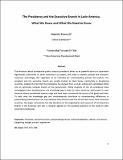| dc.description.abstract |
The literature about presidential politics depicts presidents either as all powerful actors or decorative figureheads subservient to other institutions or players, and seeks to explain political and economic outcomes accordingly. But regardless of its centrality for understanding policies and politics, the president and the executive branch are usually treated as black boxes, particularly in developing countries, despite the fact that the presidency has evolved from a small unified and centralized entity into an extremely complex branch of the government. While students of the US presidency have investigated these developments, the knowledge gap is wide for other countries, particularly in Latin America, where presidential systems reign and have been considered the source of all goods and evils. To help close the knowledge gap and simultaneously contribute to understanding differences in policymaking characteristics not only between Latin America and the US but also across Latin American countries, this paper summarizes the vast literature on the organization and the resources of the Executive Branch in the Americas and sets a research agenda on the pending questions in the study of Latin American presidencies. |

